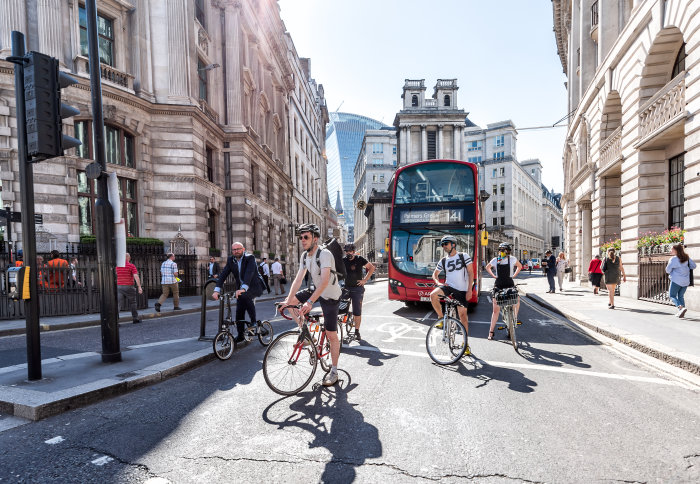Cycling is the healthiest way to get around cities

Cycling has been found to bring both the best physical and mental health benefits in a study carried out in seven European cities.
People who cycled in cities were found to have better self-perceived general health, better mental health, greater vitality, lower self-perceived stress and fewer feelings of loneliness.
The study formed part of the EU-funded PASTA project and was carried out in seven European cities: Antwerp, Barcelona, London, Örebro, Rome, Vienna and Zurich. Published in Environment International, it was led by the Barcelona Institute for Global Health (ISGlobal) and included Imperial College London researchers.
As London is trying to grapple with major health problems such as air pollution, social isolation, and obesity, why not tackle them together and get a bigger bang for our buck by promoting walking and cycling? Dr Audrey de Nazelle
The second-most beneficial transport mode, walking, was associated with good self-perceived general health, greater vitality, and more contact with friends and family.
Dr Audrey de Nazelle, from the Centre for Environmental Policy at Imperial, said: “This study adds to existing evidence that walking and cycling for transport is good for your health, and also makes people interact socially more. Combined with other issues like air pollution, it makes sense to think much more holistically about the impacts of our urban policies.
“For example, as London is trying to grapple with major health problems such as air pollution, social isolation, and obesity, why not tackle them together and get a bigger bang for our buck by promoting walking and cycling?”
Assessing health and transport
The data from the study comes from an initial questionnaire, which was completed by more than 8,800 people, 3,500 of whom also completed a final survey. It focused on transport and health and included questions about what transport modes people used, how often they used the different transport modes, and how they perceived their general health.
The mental health section of the survey focused on the four major dimensions of mental health (anxiety, depression, loss of emotional control, and psychological wellbeing), vitality (energy level and fatigue) and perceived stress. The survey also asked about participants’ social relations, including questions about loneliness and contact with friends and family.
The percentage of people who cycle remains low in all European cities, except in countries like the Netherlands and Denmark, which means that there is plenty of room to increase bicycle use. Ione Ávila Palencia
The transport modes assessed in the study were car, motorbike, public transport, bicycle, electric bicycle and walking. The effects of these transport modes were analysed using models that both considered single transport-mode journeys and multiple-mode journeys.
Ione Ávila Palencia, ISGlobal researcher and lead author of the study, said: “Previous studies have either analysed transport modes in isolation or compared various transport modes to each other. Ours is the first study to associate the use of multiple urban transport modes with health effects such as mental health and social contact.
“This approach allowed us to analyse the effects more realistically, since today’s city dwellers tend to use more than one mode of transport. It also allowed us to highlight the positive effect of walking, which in previous studies was not very conclusive.”
More cities should encourage cycling
The findings were similar in all of the cities studied. The authors say this suggests that active transport – especially cycling – should be encouraged in order to improve health and increase social interaction.
Ávila Palencia added: "The percentage of people who cycle remains low in all European cities, except in countries like the Netherlands and Denmark, which means that there is plenty of room to increase bicycle use.”
Other studies conducted as part of the PASTA project have also highlighted the health benefits of cycling. One study found that cyclists have a lower body mass index than non-cyclists and another suggested that as many as 10,000 deaths could be prevented by expanding cycling networks in European cities.
Adapted from a press release by ISGlobal
-
‘The effects of transport mode use on self-perceived health, mental health, and social contact measures: a cross-sectional and longitudinal study’ by Ione Avila-Palencia, Luc Int Panis, Evi Dons, Mailin Gaupp-Berghausen, Elisabeth Raser, Thomas Götschi, Regine Gerike, Christian Brand, Audrey de Nazelle, Juan Pablo Orjuela, Esther Anaya-Boig, Erik Stigell, Sonja Kahlmeier, Francesco Iacorossi, Mark J Nieuwenhuijsen, is published in Environmental International.
Article text (excluding photos or graphics) © Imperial College London.
Photos and graphics subject to third party copyright used with permission or © Imperial College London.
Reporter
Hayley Dunning
Communications Division